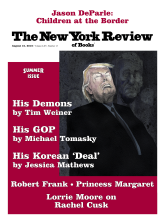Paul Goldberg’s first novel, The Yid (2016), was an antic masterpiece: a screwball comedy about the assassination of Josef Stalin and a romp through the Soviet anti-Semitic purges of 1953. The Doctors’ Plot had already been announced by newspapers, show trials had begun, and rumors of a pogrom to finish Hitler’s work were everywhere. Black Marias, the paddy wagons of the secret police, roamed the snowy streets:
At night, Moscow is the czardom of black cats and Black Marias. The former dart between snowbanks in search of mice and companionship. The latter emerge from the improbably tall, castle-like gates of Lubyanka, to return laden with enemies of the people.
Into this deadly Moscow winter Goldberg inserts a ragged, random bunch of misfits who rise up to stop the murder of Soviet Jews. A clownish Jewish actor from GOSET, the Moscow State Jewish Theater that was closed down by the Soviet government in 1949, sets in motion the unlikely events that ultimately lead to Stalin’s death. When the police arrive at his apartment to arrest him, he greets them with an elaborate bow. “‘Allow me to introduce myself: Solomon Shimonovich Levinson,’ says the old man, straightening to the formidable extent of his frame. ‘Artist pogorelogo teatra.’ Actor of a burned-down theater.” He is dressed in “sky blue long underpants, a dark brown undershirt, a deep purple robe, and a matching ascot. (Actors of burned-down theaters have an affinity for ascots.)” He graciously shows them some photographs of himself: with a group of soldiers, standing on his head in a Surrealist play, and in “Kinig Lir, the opening scene. I sit atop the throne. Lir’s throne, until they chase me away. The Nar is on the throne.”
The Nar—the Fool—then gracefully flies into a pirouette he used to perform in Bar Kokhba, the classic Yiddish play about revolt by Abraham Goldfaden. In an inversion of method acting, about which there is some conversation in the novel, Levinson turns his art into his life—as well as three deaths—and flamboyantly hurls daggers at the policemen, slitting their throats.
What follows is a farce, a meditation on theater, a primer in Soviet anti-Semitic mythology, and the shaggy tale of a desperate attempt by Levinson and his friends to get rid of the bodies and stop the pogrom they fear is imminent. One member of the tiny rebellion, a Jewish doctor named Kogan, a war hero who has become a pacifist, has begun to
think of purges as epidemics that start out with a small, concentrated population, then expand their reach nationally, even globally. Once he picked up a blank piece of paper and started to jot down the fundamentals of a discipline he would call politico-historical epidemiology.
Another accidental conspirator, an engineer and an old friend of Levinson’s named Lewis, was simply planning to spend the night. Instead, he discovers Levinson in his purple robe standing over three bloody corpses. Lewis is a Yiddish-speaking African-American expatriate modeled on and often mistaken in the novel for Paul Robeson:
Paul Robeson. A Russian-speaking Negro who gave his voice to the working men. A Yiddish-speaking Negro. A hero of the Left. An athlete, actor, musician, champion of the oppressed, a Red Othello. There were worse names to call a man—and in America, Lewis was called those names, as was Paul Robeson.
A poet tags along, too. She both quotes and resembles Anna Akhmatova. Her contemporaries “died in prisons,” the narrator comments, “revolutions, wars, and famines; by hanging and by the despair that comes with driving taxis on Paris boulevards and selling insurance in New Jersey. They vanished, but she stood guard over the remnants of the beauty that once inspired them.” Describing his Akhmatova-like poet, Goldberg writes:
It’s a testament to the spiritual paucity of the Anglophone culture that the words blazhennaya and yurodivaya translate simply as mad, for they connote a completely different view of madness, an ability to tap into the spiritual realm and communicate insights the rest of us are not given the power to obtain by conventional means.
The variations of madness become essential to The Yid, a crazy book about a dark time. In his new novel, The Château, Goldberg takes on the absurdity of another dark time: the rise of Donald Trump. Specifically, the shocked, eerie January 2017, after his election, just before his inauguration.
Parody of a buffoon is too easy—satire is constantly being preempted by reality. Also, laughter itself can feel tainted these days. There is an unnerving sense that it makes you complicit, manipulated the way totalitarian regimes have traditionally manipulated their populations with humor by using it as a diversion, a steam valve for serious outrage. But The Château, in ways as unlikely, though not quite as elegant, as Levinson’s deadly pirouette, delivers both escape and truth. Goldberg’s novel lets you laugh while relinquishing neither hope nor despair.
Advertisement
Goldberg, the author of two books about the Soviet human rights movement, grew up in Moscow. He didn’t emigrate to the United States until he was fourteen, in 1973, and his melancholy intimacy with the streets, the communal apartments, and the winter nights is evident throughout The Yid. He’s also the coauthor of an exposé on the US health care system, another kind of knowledge that animates The Château.
It is the winter of 2017, and the place is sunny Miami, not icy Moscow. Time is suspended between the election and the inauguration. Trump hovers in the future, but it is the past that tells us all we need to know. In The Yid, Lewis asks, “Absurdity and history…aren’t they the same, in your country?” “Yes, Comrade Lewis, definitely, proudly, yes!” is the reply. The Château is a comic yarn about Russians who now inhabit the condominium splendor of Miami but have brought their history and their absurdity with them. Bill Katzenelenbogen, an investigative reporter and the son of one of these retired émigrés, has devoted his career to exposing fraud. Born in Moscow, he grew up in the United States where he added a W and an M to his real name, Ilya, to make it William. “A top-flight journalist in his thirties and forties, he flew into turbulence after crossing into his fifties,” and has just been fired from The Washington Post for insubordination.
Bill has no plans and less money. Hard-drinking (his drink is a TB—Tito’s vodka and Bombay gin in equal parts), down at heart and heel, good-looking but not too good-looking,—Bill is an instantly recognizable soft-noir antihero. He even has a Nero Wolfe sort of kooky hobby: collecting midcentury-modern furniture from dumpsters. There is an ex-wife who hounds him for money. (She, too, has a hobby. She collects grievances, a pursuit that “resulted in an Equal Employment Opportunity action against her former employer, the Equal Employment Opportunity Commission.”) And there is a young woman, Gwen, a reporter whom he helped when she was fired years ago for filling the Style section of The Washington Post with conversations from parties “that sounded like something out of Franny and Zooey” and, indeed, turned out to be conversations from Franny and Zooey.
When Bill reads that his roommate from Duke, a fellow Russian named Zbig, has fallen from a forty-third-floor balcony, Gwen encourages him to investigate the death and write a book about it. Zbig had become a successful plastic surgeon with a specialty: he was a renowned “posterior designer.” An admirer of his own work and the ladies who were his patients, Zbig was also what Bill calls a “Doctor Without Boundaries.” Bill’s memories of his college days, though, have less to do with womanizing than his own obsession
with the raspy-voiced, screaming Muscovite poet Volodya Vysotsky, the kind of bard who uses exclamation marks more than any other form of punctuation:…
I’ll water the stallions,
I’ll finish the song,
I’ll stand on the edge for a moment more!
The mystery of Zbig’s fall shuffles in and out of the story like a disenchanted, round-shouldered teenager passing through the living room at his parents’ cocktail party. You see him, you know he lives there, you hope he gets into a good college, you watch him disappear with something between indifference and relief, and you go back to your conversation. In The Château, that conversation is primarily between Bill and his father, Melsor. The name “Melsor” is a patriotic acronym for Marx Engels Lenin Stalin October Revolution, but Melsor Katzenelenbogen was a dissident poet in Russian. “If you cross American fraud with Russian literature, you get…Melsor Yakovlevich Katzenelenbogen, an expert in both,” Bill explains.
Melsor describes himself as a Russian poet and American health care entrepreneur. He tried to follow the typical émigré dissident-poet career path to Voice of America, but when asked to do a simple voice test, he instead read his own poetry for hours, then topped off the session by singing one of Stalin’s favorite songs. Reduced to editing a Russian shopper, “which he mostly filled with unauthorized translations from the National Enquirer,” Melsor eventually moved on to what Bill explains is another typical Russian émigré career move: Medicare fraud.
Fraud is always the answer, and Medicare the target of choice. Medicaid, too, can be lucrative. Being litigious works. Medical malpractice and employment discrimination suits are fine.
As one of the residents of the Château, the highrise Melsor lives in, puts it, “How can a smart man not accept things that—like Gogol had it—swim into your hands?”
Advertisement
Bill has not spoken to his father for twelve years, since Melsor’s trial for an ambulette scam. But broke and desperate, he goes to stay with him at the Château while he tries to find material on Zbig. The place, he discovers, is a neglected Morris Lapidus building that is a microcosm of America: a seething fiasco of polarization, its infrastructure crumbling, its board of directors feuding, its financing corrupt. The Americans and the Russians are in warring camps. “We are completely different people,” Melsor says.
We go on Broadwalk in early morning, they sit in their units and read newspaper. In afternoon, we swim in ocean, they don’t swim at all. They sit near swimming pool under umbrella, smeared with lotions. We are brown. They are completely white.
“Make Château Great Again,” reads a sign for the coming election of board members. That sign and that sentiment belong, of course, to Melsor, who is running for vice-president. (“Nobody wants to be president. President signs all papers. If there is forensic audit, he goes to prison.”) The Château’s parking lot, the pool, and now the balconies are being torn up by a construction company that gives kickbacks to the board members who authorize the work. The condo then takes loans and raises assessments to pay for it. The company never finishes the work, no one can sell because of the mess, and those who cannot afford the huge assessments are foreclosed on.
Bill encounters one of the victims of foreclosure when he first approaches the Château. Stopping to examine some garbage bags full of possible treasures, he is attacked by an old woman with a cane screaming “svolochi.” Goldberg pauses the story to politely ask the reader to
please consider yourself beseeched to learn the word svoloch’, which roughly, very roughly, translates as vermin, or lowlife, or scum, or maybe swine…. It comes from the Russian word volok, the making of felt…. Svoloch’ is the making of life into felt, the turning of individual strands into filthy uniform matter.
From the vaudevillian spectacle of a little old lady whacking a stranger with a cane and calling him vermin, we arrive at oppression. Goldberg uses the Russian language and the way it translates into English for more than comic effect; the act of translation is used as insight into those Russian twins, absurdity and history. There is a lot of Russian spoken and translated in the novel. The foreign words and phrases act as a chorus commenting on our comfortable American assumptions. Some things don’t translate easily from Russian, Goldberg seems to be saying. But others translate all too well.
Melsor wears hot pink Ralph Lauren polo shirts, white pants and belt and shoes, and a lavender ascot. He says things like “There is such saying: ‘You are as young as your youngest mistress.’” Medicare and Medicaid, according to Melsor, are simply “abandoned property.” The government has committed “tributary negligence” by making it so easy to steal from them. He has two copies of The Art of the Deal, one in English, one in Russian, passages of which he has adoringly marked up and underlined. As part of his election campaign, Melsor even begins to write poetry again:
There’s no room for joy and laughter
In our beautiful Château.
See the flooding in Main Lobby!
Behold the crippling of South Pool!
The current vice-president of the board is a man named Greenstein. His father-in-law was a Nazi who worked for Ford in Detroit after the war, and kept a box of gold teeth underneath the bed. Melted down, they paid for the apartment at the Château. “He saved all this for us,” the daughter says. “He struggled on his assembly-line salary and never sold a single tooth.”
To help him defeat Greenstein and all the bribe-taking members of the board, Melsor convinces Bill to pretend that he speaks no Russian and that they’ve never met. In a nod to Gogol’s The Inspector General, the Russians mistake Bill for an FBI agent. When he drinks vodka one night with a seemingly sympathetic Château neighbor named Alex, his proficiency in Russian is detected when he cannot help mouthing the words to a recording of the dissident balladeer Aleksandr Galich.
“You know, we have expression,” Alex tells Greenstein later in an effort to trade information to stave off his own eviction from the Château, “fisherman sees other fisherman from far. I tell you, he knows us and is pretending not to! When FBI sends agent who speaks Russian and understands Russia…This is complicated situation.” The lyrics that give Bill away as the Russian-speaking FBI agent he is not, the words he could not help mouthing, are these:
Our train is leaving for Auschwitz
Today and daily.
Goldberg looks back on dissidents of Melsor’s generation like Galich and Vysotsky with nostalgia. In the 1960s and 1970s, Galich was “a middle-aged man reciting tales of prison camps and the utter absurdity—criminality—of life in the USSR. Those were glorious days. The truth was…easy to spot.” In those glory days of clarity, Vysotsky and Galich sang their ballads in secret, strumming their guitars in apartment living rooms, making reel-to-reel tape recordings known as magnitizdat, which were passed along and copied like samizdat. The Château, with all its burlesque and comic hijinks, has the raspy, sometimes obvious, cynical and simultaneously earnest tone of a protest song.
Goldberg treats us to another artistic protest genre called chastushki: “four-line Russian folk poems, sort of rhyming, limerick-like, usually obscene, often sung by women in traditional costumes. They have been used for political purposes, too.” Melsor has written a selection of chastushki to be sung during the condo board election. Bill is coaxed into translating the doggerel grievances. He is not proud of his translations, but they say what needs to be said:
In our garage for a long time now
Rats and mice are running amok!
They are leaving us their turds
That’s how we are persecuted.
Three old Jewish women Melsor finds on Craigslist appear at the meeting dressed in peasant costumes complete with headdresses, accordion, balalaika, and two wooden spoons for percussion: “One of the singers—the wooden spoonist—emits a guttural sound, the sort that makes chastushki what they are…. All three women carry sheets of paper, which they throw at the audience, like propaganda leaflets from a plane.”
Needless to say, Melsor wins the election, and corruption at the Château is less vanquished than rerouted. And Melsor turns his chastushki away from the condo and out to the new order:
Don’t you worry, don’t you fear!
Muslim hordes stand no chance here.
Long live Donald! Hooray Trump!
Load your AR-15!
Onward! Watch them fall! We win!
The Yid was fantasy, a wild, imaginative revenge-fantasy. The novel’s immoderate vision, the emotional and historical urgency of Jews in the Soviet Union in 1953, and the improbable characters themselves gave it truth. The rather half-hearted detective-story premise of The Château is of course feeble in comparison to the murder of Stalin by theatrical Jews. You might dismiss the novel as light and quirky, too light and too quirky, another contribution to a genre created for escape. But the real charm and energy of The Château lies not in the suspense of a mild mystery novel. It lies in the suspended animation of January 2017. There are quite a few references to falling in the novel, and The Château captures the Wile E. Coyote moment, eyes open, motionless, hanging in the ether, just before…well, you know.
Goldberg pokes at the politics of the United States with the stick of Russian cynicism, and simultaneously listens at the keyhole of Russian cynicism with the ear of an Americanized cynic. The Château is the perfect summer beach book for those of us too agonized by the world as it is to escape into a summer beach book. He has given us the luxurious pleasure of relaxing into the belly of the beast. Authoritarian governments, conspiracy, corruption, greed, and fraud! Come and bask in the golden clarity of outrage, sing along with Galich, laugh at good old Russian absurdity and history, absurdity so foreign to us here. Raise your glass of vodka in that glorious moment before…well, you know.
This Issue
August 16, 2018
The ‘Witch Hunters’
The American Nightmare
The Queen of Rue





